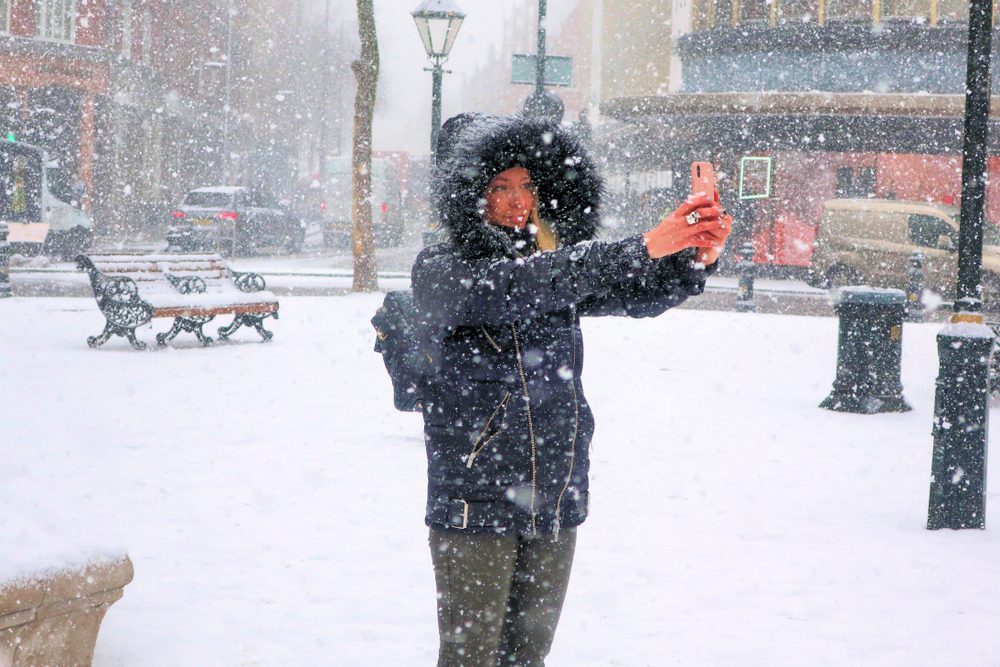![]() Many of us have heard: “Don’t go outside without a coat; you’ll catch a cold.”
Many of us have heard: “Don’t go outside without a coat; you’ll catch a cold.”
That’s not exactly true. As with many things, the reality is more complicated. Here’s the distinction: Being cold isn’t why you get a cold. But it is true that cold weather makes it easier to get the cold or flu. It is still too early to tell how weather impacts the COVID-19 virus, but scientists are starting to think it behaves differently than cold and flu viruses.
As an associate professor of nursing with a background in public health, I’m asked about this all the time. So here’s a look at what actually happens.
Many viruses, including rhinovirus – the usual culprit in the common cold – and influenza, remain infectious longer and replicate faster in colder temperatures. That’s why these viruses spread more easily in winter. Wearing a heavy coat won’t necessarily make a difference.

The cold weather does have an impact on whether or not you catch a cold. Image credit: Brian Minkoff/Shutterstock.com
Virus transmission is easier when it’s cold
More specifically, cold weather can change the outer membrane of the influenza virus; it makes the membrane more solid and rubbery. Scientists believe that the rubbery coating makes person-to-person transmission of the virus easier.
It’s not just cold winter air that causes a problem. Air that is dry in addition to cold has been linked to flu outbreaks. A National Institutes of Health study suggests that dry winter air further helps the influenza virus to remain infectious longer.
How your immune system responds during cold weather also matters a great deal. Inhaling cold air may adversely affect the immune response in your respiratory tract, which makes it easier for viruses to take hold. That’s why wearing a scarf over your nose and mouth may help.
Also, most people get less sunlight in the winter. That is a problem because the Sun is a major source of vitamin D, which is essential for immune system health. Physical activity, another factor, also tends to drop during the winter. People are three times more likely to delay exercise in snowy or icy conditions.
Instead, people spend more time indoors. That usually means more close contact with others, which leads to disease spread. Respiratory viruses generally spread within a six-foot radius of an infected person. When you are indoors, it is very likely that you are closer together than six feet.
In addition, cold weather dries out your eyes and the mucous membranes in your nose and throat. Because viruses that cause colds and flu are typically inhaled, the virus can attach more easily to these impaired, dried-out passages.

Spending more time indoors can increase the chances of catching a cold. Image credit: Rawpixel/Shutterstock.com
What you can do
While the bottom line is that being wet and cold doesn’t make you sick, there are strategies to help prevent illness all year long.
-
Wash your hands often.
-
Avoid touching your face, something people do between nine and 23 times an hour.
-
Stay hydrated; eight glasses a day of water is a good goal, but that could be more or less depending on lifestyle and the size of the person.
-
Eat a well-balanced diet. Dark green, leafy vegetables are rich in immune system-supporting vitamins; eggs, fortified milk, salmon and tuna have vitamin D.
-
Stay physically active, even during the winter.
-
Clean the hard, high-touch surfaces in your home often.
-
If your nose or throat gets dry in the winter, consider using a humidifier.
-
Get the flu vaccine.
And one more important thing this year: When it’s your turn, make sure you get the COVID-19 vaccine.
Libby Richards, Associate Professor of Nursing, Purdue University
This article is republished from The Conversation under a Creative Commons license. Read the original article.
Source Link: Will Going Out In The Cold Give You A Cold?